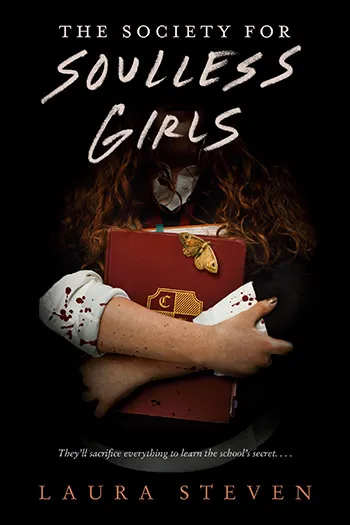Laura Steven fell in love with literature at a young age. "I was always that 'Matilda' kid who spent her weekends at the library, checking out the maximum number of books and finishing them all by Tuesday," she said. Her early love of literature fueled the writing of her thrillers, comedies, and contemporary and fantasy novels – though her latest is something completely new.
Steven's The Society for Soulless Girls is a dark Sapphic horror novel with feminist undertones. The book follows Lottie, a college freshman, and her angsty roommate, Alice, as they attempt to solve a mystery on their campus. Spooky twists arise as the pair follows the clues (and their hearts) in this modern adaptation of Jekyll and Hyde.
A real-life Jekyll and Hyde
If the characters in the novel feel like they could be real people, it's because, in a way, they are. Each represents a part of Steven. "The two main characters are my own Jekyll and Hyde," she said. "Lottie, the sunshiny Elle Woods hockey player, is how I present to the outside world. But Alice is how I often feel inside – angry, alienated, and self-loathing."
Steven started writing the book in 2020 as the pandemic began. She wanted to explore a dark academic setting and originally pitched the story as "a straight-up murder mystery reimagining of Jekyll and Hyde." As the world changed around her, she found writing the book a cathartic way to process hard feelings.

"I wrote it during a particularly difficult time in my life – I'd just become a mother in the middle of a pandemic – and channeled those feelings of isolation and bitterness into the work," Steven said. The book allowed Steven to embrace her inner turmoil and let some of the darkness she had been holding back boil to the surface.
Embracing anger
Steven hopes the book can help other angsty young Queer people. "It's such a rich, raw emotional minefield. You've come of age . . . but now what? How are you going to show up in the world? What are you going to make of your life?"
The main answer Steven wants readers to find in her novel is that it's okay for women and Queer people to embrace anger. "You're not broken for feeling angry – it's knowing what to do with that anger that makes or breaks us," she said. "For young women and other marginalized communities, anger is often the most important political tool we have. When we use that righteous fury to organize and drive for change, magic can happen."
While writing helped Steven learn more about the power of anger, she also warns readers to wield it responsibly. "Anger is not carte blanche to treat others poorly," she said. "That's the journey Alice goes on in this book. When is it okay to lash out? And when should we bite our tongue or find other outlets for our rage?"
Anger is common for Queer people like Alice who face backlash for simply trying to live. While both anger and Queerness are part of the story of The Society for Soulless Girls, Steven doesn't think the sexuality of her characters changes the plot. "The story could certainly exist without the romance, sure, but would that be any fun at all?" she asked.
Writing Queer books
Soulless Girls is the eighth novel Steven has published. She's noticed readers and critics tend to treat literature differently when it centers on LGBTQ+ protagonists. "I was never asked why I wrote a straight protagonist," she said. "Truthfully, I write the world the way I see and experience it, and as a Bisexual woman, I've surrounded myself with a glorious Queer community. It would feel strange to me not to represent that on the page." Writing Queer characters is more fun for her and opens up opportunities for more romantic possibilities.
Steven plans to continue writing LGBTQ+ novels. "My next novel is a supernatural love story spanning one thousand years, which transcends time and fate and gender," she said. "Two reincarnated souls keep falling in love throughout history, while also having to kill each other before their 18th birthdays for reasons they cannot remember. Of course, as they spawn into different existences, their genders and bodies change constantly, but what doesn't change is the love in their heart. Writing it was a powerful, life-affirming exploration of Queerness – and what it means to fall in love with a person, not a gender."
Each new story Steven writes is far different from the last one. With eight published novels under her belt at only 32 years old, she says she isn't planning on slowing down anytime soon.


